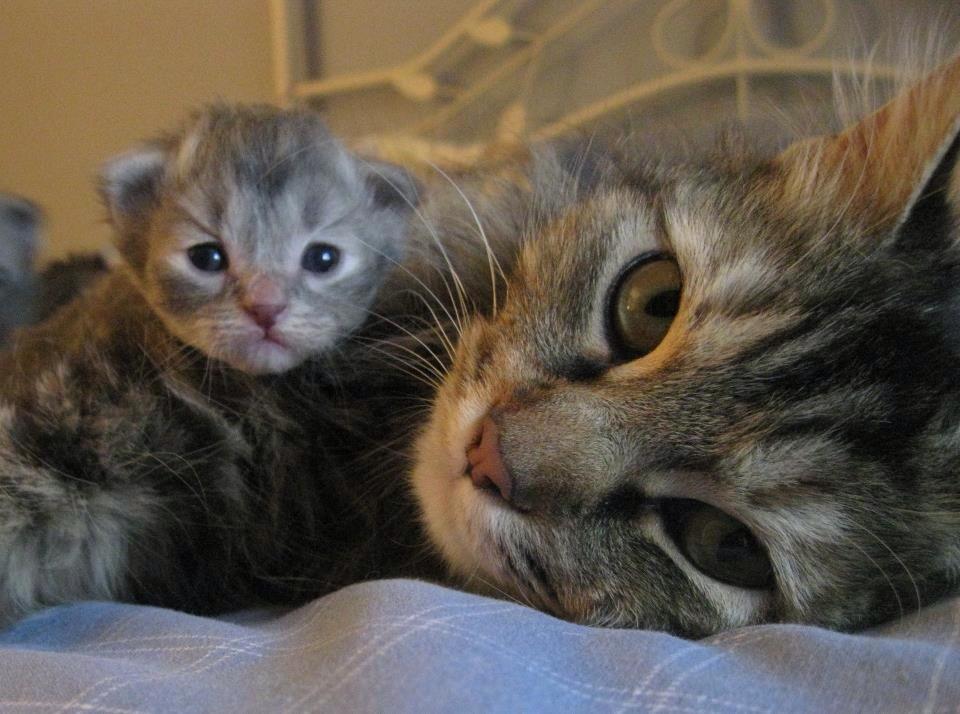 Your first instinct when you see kittens may be to swoop them up and
take them home with you, but that is not always in the best interest
of the kittens--or you. Socializing and caring for feral kittens is a
time-consuming process which requires devotion, patience, and
attention. The decision to bring feral kittens into your home should
not be taken lightly.
Your first instinct when you see kittens may be to swoop them up and
take them home with you, but that is not always in the best interest
of the kittens--or you. Socializing and caring for feral kittens is a
time-consuming process which requires devotion, patience, and
attention. The decision to bring feral kittens into your home should
not be taken lightly.
First Steps
Some kittens may need intervention if they are not doing well. Remember that early weaning of kittens who seem to be doing well may lead to increased mortality or failure to thrive. Although kittens begin weaning prior to eight weeks of age, if it's safe they should remain with their mother until then to learn proper behavior and socialization. Learn more about the first steps to take when you find kittens outdoors.
Next Steps
In order to do what's best for kittens, you MUST know how old they are first. Please review the various scenarios first to help decide what the next best steps should be. Learn more about kitten and mom scenarios.
Caring for Very Young Kittens
Kittens can easily become chilled and can actually die from chilling within a short time. Be sure that from the moment you find them, the kittens are kept constantly warm. Continually keep an eye out for signs of chilling (i.e., kittens are listless and feel cool to the touch). If you have nothing else on hand, use your own body heat to warm up a cold kitten, and rub gently to aid circulation. It is important to note that kittens cannot control their own body temperature until they are at least three weeks old. Do not bottle feed until kittens have warmed up completely. Learn more about caring for neonatal kittens.
Socializing Kittens
To become pets, they will need to be socialized, or taught to be comfortable around people. If the kittens are eight weeks or younger, usually just about anyone can socialize them by following some simple steps. Kittens between two months (eight weeks) and fourth months of age often take more time and skill to socialize. Socializing kittens is a big commitment. Learn more about socializing kittens.
To learn more about taming ferals check out these tips from the Urban Cat League:
Watch the video Tough Love, Socializing Feral Kittens and read their taming guidelines as well as the many tips for living with feral cats on their blog.
More information
Momma Mia! 7 Important Tips When Caring for Momma Cats and Kittens from Fixnation.org
If you are caring for a mom cat and her kittens - here are seven important things you need to remember when caring for a momma cat and her nursing newborns.
What to Do (and NOT Do) If You Find a Newborn Kitten from AnimalAllianceNYC.org
During high kitten season in the spring and summer, it's not unusual to discover a nest of unattended kittens or a single kitten seemingly abandoned by the mother. You want to help, right? Before jumping to the rescue, consider these recommendations.
Bottle-Feeding Orphaned Newborn Kittens from NYCFeralCat.org
Resources and tips for feeding and caring for orphan kittens.
Immediate Warmth will be your First Order of Business from Hartz.com
What do you do if you discover a kitten (or a litter of kittens) that feels cool to the touch. Warming the kitten is your #1 priority.

